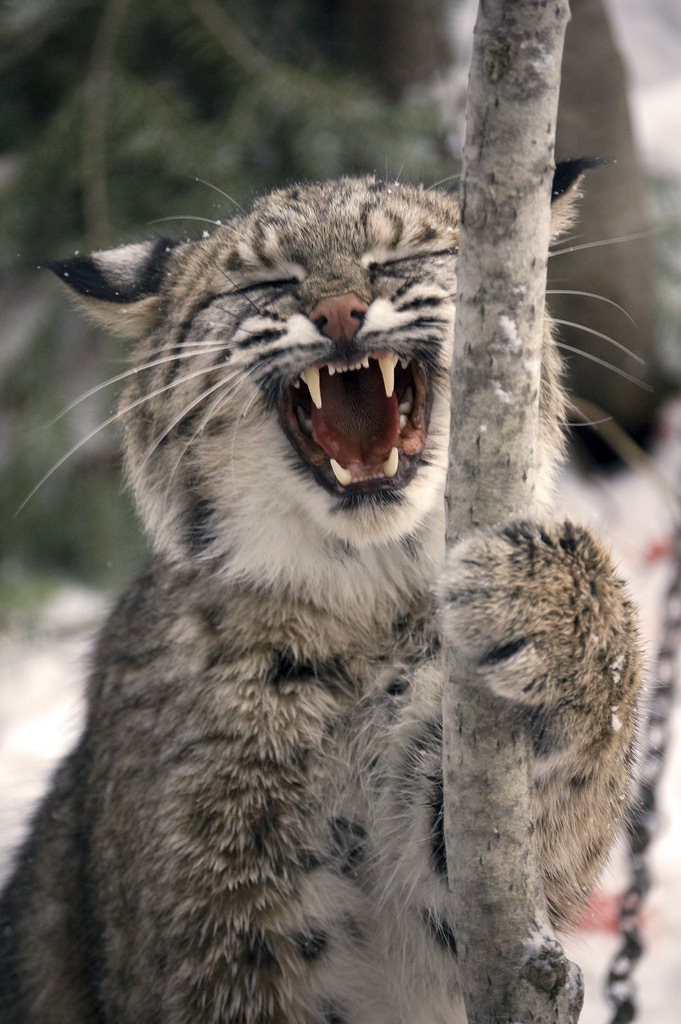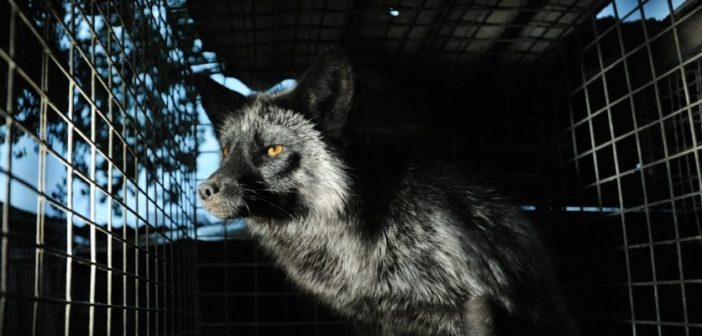Jewish worshipers chant every Sabbath morning, “The soul of every living being shall praise God’s name” (Nishmat kol chai tva’rech et shim’chah). Yet, some come to synagogue during the winter months wearing coats that required the cruel treatment of living beings whose souls praise God.
To decide whether the use of fur is a significant Jewish issue, we should consider several related questions:
- What does the Jewish tradition say about the treatment of animals?
- How much suffering do animals raised or trapped for their fur experience?
- Does the wearing of fur coats have redeeming factors that would over ride Jewish teachings related to the proper treatment of animals?
JUDAISM AND ANIMALS
Judaism has beautiful and powerful teachings with regard to showing compassion to animals. The following are a few examples:
Moses and King David were considered worthy to be leaders of the Jewish people because of their compassionate treatment of animals while they were shepherds. Rebecca was judged suitable to be a wife of the patriarch Isaac because of her kindness in watering the ten camels of Eliezer, Abraham’s servant. Rabbi Yehuda the Prince, the redactor of the Mishna, was punished for many years at the hand of Heaven for speaking callously to a calf being led to slaughter who sought refuge beside him.
Many Torah laws mandate proper treatment of animals. One may not muzzle an ox while he is working in the field, nor yoke a strong and a weak animal together. Animals, as well as their masters, are meant to rest on the Sabbath day. The importance of this concept is indicated by the fact that it is mentioned in the Ten Commandments and on every Sabbath morning as part of the kiddush ceremony.
The psalmist indicates God’s concern for animals, stating that, “His compassion is over all of His works” (Psalm 145:9). And there is a mitzvah (commandment) in the Torah to emulate the Divine compassion, as it is written: “And you shall walk in God’s ways” (Deuteronomy 28:9). Perhaps the Jewish attitude toward animals is best expressed by Proverbs 12:10: “The righteous person considers the soul (life) of his or her animal.” The Torah prohibits Jews from causing tsa’ar ba’alei chayim, any unnecessary pain, including psychological pain, to living creatures.
Rabbi Samson Raphael Hirsch, an outstanding 19th century philosopher, author, and Torah commentator, eloquently summarizes the Jewish view on treatment of animals:
“Here you are faced with God’s teaching, which obliges you not only to refrain from inflicting unnecessary pain on any animal, but to help and, when you can, to lessen the pain whenever you see an animal suffering, even through no fault of yours.” (Horeb, Chapter 60, #416)
THE PAIN OF FUR-BEARING ANIMALS
Fur is obtained from animals who are either trapped or raised on ranches. Both involve treatment of animals that appears to be far from the Jewish teachings that have been previously discussed.
Animals caught in steel-jaw leg hold traps suffer slow, agonizing deaths. Some are attacked by predators, freeze to death, or chew off their own legs to escape. It has been said that one can get a “feel for fur” by slamming their fingers in a car door. A Canadian Wildlife service report gives an idea of the terror that trapped animals face and their desperate efforts to escape:
“The stomachs of [trapped] arctic foxes . . . often contain parts of their own bodies. They may swallow fragments of their teeth broken off in biting the trap, and sometimes part of a mangled foot; almost every stomach contains some fox fur, and a considerable number contain pieces of skin, claws, or bits of bone.”

Bobcat caught in leghold trap. Image credit Seth Carlson, Flickr, CC BY-NC 2.0
Over 100 million wild animals are killed for their pelts every year. Many species of animals killed for their furs have become endangered or have disappeared completely from some localities. Millions of animals not wanted by trappers, including dogs, cats, and birds, die in traps annually and are discarded as “trash animals.” Many trapped animals leave behind dependent offspring who are doomed to starvation.
Treatment of animals raised on “fur ranches” is also extremely cruel. Confined to lifelong confinement, millions of foxes, beavers, minks, ocelots, rabbits, chinchillas, and other animals await slaughter with nothing to do, little room to move, and all their natural instincts thwarted. The animals are treated simply as means to the ends of maximizing production and profit, and no regard is given for their physical, mental, or emotional wellbeing. Because of the enforced confinement and lack of privacy, naturally wild animals often exhibit neurotic behaviors such as compulsive movements and self mutilation. The animals finally suffer hideous deaths, including electrocution by rods thrust up their anuses; by suffocation; by poisoning, which causes painful muscle cramping; or by having their necks broken.
According to the International Society for Animal Rights, Inc., to make one fur garment requires 400 squirrels; 240 ermine; 200 chinchillas; 120 muskrats; 80 sables; 50 martens; 30 raccoons; 22 bobcats; 12 lynx; or 5 wolves.
IS FUR NECESSARY?
Judaism puts human beings on a higher level than animals, and indicates that animals may be harmed and even killed if an essential human need must be met. However, is the wearing of fur truly necessary for people to stay warm during wintry weather? There are many non-fur coats and hats, available in a variety of styles, that provide much warmth. Imitation fur is produced at such a high level of quality that even among Chasidim, the most strictly traditional Jews, there is a small but growing trend to wear synthetic “shtreimlach” (fur-trimmed hats).
Based on the prohibition of tsa’ar ba’alei chayim, Rabbi Chaim Dovid Halevy, Sephardic Chief Rabbi of Tel Aviv issued a p’sak (rabbinic ruling) in March 1992, indicating that Jews should not wear fur. Rabbi Halevy asked:
“Why should people be allowed to kill animals if it is not necessary, simply because they desire the pleasure of having the beauty and warmth of fur coats? Is it not possible to achieve the same degree of warmth without fur?”

Shtreimlach, or fur caps, worn by Chasidic Jewish men. Image credit Nathan Engel, Pexels.
In his book, The Jewish Encyclopedia of Moral and Ethical Issues, Rabbi Nachum Amsel, a modern Israeli educator, states: “If the only reason a person wears the fur coat is to ‘show off’ one’s wealth or to be a mere fashion statement, that would be considered to be a frivolous and not a legitimate need.” Rabbi Amsel also points out that hunting for sport is prohibited because it is not considered a legitimate need (Avodah Zarah 18b).
OTHER CONSIDERATIONS
The Talmud teaches that Jews are to be “rachmanim b’nei rachmanim,” compassionate children of compassionate ancestors (Beitza 32b). One has to wonder if the wearing of fur is consistent with that challenging mandate.
Are the following words of Isaiah valid today if we fail to show compassion to animals?
“Even though you make many prayers, I will not listen. Your hands are full of blood.” (Isaiah 1:12-15)
What kind of lesson in Jewish values are young people learning when they see worshipers coming to synagogue in fur coats on the Sabbath day?
Not only do animals benefit from our compassion and concern – we, too, benefit by becoming more sensitive and more humane, as Jews and as civilized human beings.
Republished with permission from The Schwartz Collection on Judaism, Vegetarianism, and Animal Rights
Featured image: caged fox in fur farm. Credit Jo-Anne McArthur / We Animals / cropped.






